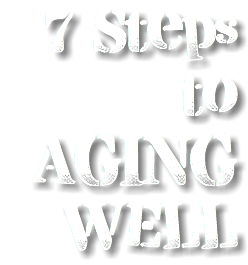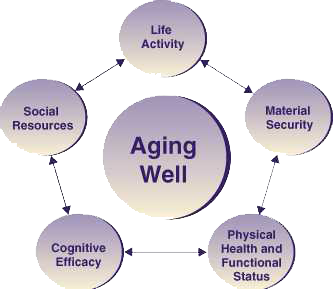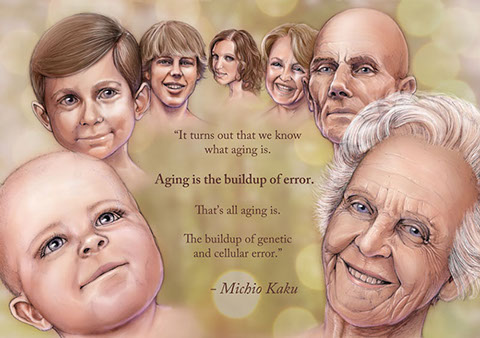


1. Control Your Blood Pressure
Why? You can have high BLOOD PRESSURE (BP) — also called HYPERTENSION — and still feel fine. That's because high blood pressure does not cause symptoms that you can see or feel. But high blood pressure, sometimes called "the silent killer," is a major health problem. If not treated, it can lead to stroke, heart disease, eye problems, and kidney failure.
• Normal BP—Your systolic (top, or first, number) pressure is less than 120 and your diastolic pressure (bottom, or second, number) is less than 80—for example, 119/79.
• Prehypertension—Your top number is between 120 and 139 or the bottom number is between 80 and 89. You may be at risk for developing high blood pressure.
• High BP—Your blood pressure measures 140/90 or higher at two or more checkups.
What You Can Do
• Keep a healthy weight. Being overweight adds to your risk.
• Exercise every day. Moderate exercise can lower blood pressure. Check with your doctor before starting a new exercise plan.
• Eat more fruits, vegetables, whole grains, and low-fat dairy foods. To control high blood pressure, eat a diet rich in these foods. Fresh fruits and vegetables are high in potassium, which you need.
• Cut down on salt and sodium. Most Americans eat more salt and sodium than they need. A low-salt diet might help lower your blood pressure.
• Drink less alcohol. Drinking alcohol can affect blood pressure. As a general rule, men should have no more than two drinks a day; women no more than one a day.
• Follow your doctor's orders. If lifestyle changes alone do not control your BP, your doctor may prescribe blood pressure pills.
3. Control Your Weight
Why? Research shows that extra weight puts you at higher risk for a multitude of health risks as you age: TYPE 2 DIABETES (high blood sugar), high blood pressure, heart disease and stroke , some types of cancer, SLEEP APNEA (when breathing stops for short periods during sleep), OSTEOARTHRITIS (wearing away of the joints), and many other problems.
What You Can Do:
Losing as little as 5 to 15 percent of your body weight can do much to improve your health. A safe rate of weight loss is 1/2 to 2 pounds per week. Try some of these ideas to support your weight-loss efforts:
• Keep a food diary.
• Shop from a list and shop when you are not hungry.
• Dish up smaller servings. At restaurants, eat only half your meal and take the rest home.
• Eat at a table and turn off the TV.
• Be realistic. Aim for a slow, modest weight loss.
• Seek emotional support from family and friends.
• Expect setbacks and forgive yourself.
• Make physical activity part of your weight-loss plan.
4. Exercise
Why? Physical activity burns calories. When you burn more calories than you eat each day, you will take off pounds. As we age, most of us lose from 20 to 40 percent of muscle mass. The quality of muscle tissue in older adults is also decreased. Strength exercises can partly restore muscles and strength, often very quickly.
What You Can Do:
Talk to your doctor about how much exercise is right for you. A good goal for many people is to work up to exercising 4 to 6 times a week for 30 to 60 minutes at a time. Exercise: A Guide from the National Institute on Aging is a publication from NIA that has strength, balance, and stretching exercises you can do at home.
2. Control Your Cholesterol
Why? CHOLESTEROL is a waxy, fat-like substance present in cell walls or membranes everywhere in the body, including the heart. Your body needs some excess cholesterol, but excess cholesterol deposited in your blood can raise your risk of HEART DISEASE OR STROKE. Excess cholesterol can build up in your arteries, including the coronary arteries, where it contributes to narrowing and blockage. Cholesterol travels through the blood in two "packages": High-density lipoproteins (HDL) is the "good" cholesterol. It carries cholesterol in the blood from other parts of the body to the liver, which removes it. HDL keeps cholesterol from building up in the walls of the arteries. Low density lipoproteins (LDL), the "bad" cholesterol, leads to a buildup of cholesterol in the walls of your arteries. The higher the LDL level in your blood, the greater your chances of developing coronary heart disease.
What You Can Do:
Reduce your LDL bad cholesterol and raise your HDL good cholesterol through diet and exercise. If that fails, you may need drugs.
• Therapeutic Lifestyle Changes (TLC)—TLC includes a cholesterol-lowering diet (called the TLC DIET), physical activity, and weight management. TLC is for anyone whose LDL is above the goal set by your physician.
• Drug Treatment—If cholesterol-lowering drugs are needed, they are used together with TLC treatment to help lower LDL.
5. Stop Smoking
Why? Tobacco use remains the single most preventable cause of death in the United States. Cigarette smoking accounts for nearly one-third of all cancer deaths in this country each year. Smoking is the most common risk factor for the development of lung cancer, which is the leading cause of cancer death. It is also associated with many other types of cancer. Smoking also increases the risk of other health problems, such as chronic lung disease and heart disease. Smoking during pregnancy can have adverse effects on the unborn child, such as premature delivery and low birth weight.
The National Cancer Institute (NCI) has smoking cessation guidelines in its Cancer Topics online at www.cancer.gov/cancertopics . The American Lung Association's "Freedom From Smoking Online" program (www.ffsonline.org) offers a very thorough approach to smoking cessation, with support from many other smokers and former smokers.
What You Can Do:
All health care professionals agree that quitting smoking is the best gift you can give yourself and your loved ones.
6. Don't Drink Too Much
Why? The consequences of alcohol misuse are serious — in many cases, life threatening. Heavy drinking can increase the risk for certain cancers, especially those of the liver, esophagus, throat, and larynx (voice box). Heavy drinking can also cause liver CIRRHOSIS, immune system problems, brain damage, and harm to the fetus during pregnancy. In addition, drinking increases the risk of death from automobile crashes as well as recreational and on-the-job injuries.
What You Can Do:
Moderate alcohol use — up to two drinks per day for men and one drink per day for women and older people — is not harmful for most adults. (A standard drink is one 12-ounce bottle or can of either beer or wine cooler, one 5- ounce glass of wine, or 1.5 ounces of 80-proof distilled spirits.)
ould be tested.

7. Follow Preventive Measures Proven to Help
Why? Taking responsibility for your own health as you age means being an active participant with your physician and other health care professionals.
What You Can Do:
Here are 5 preventive steps to follow:
• Find and stay with a "medical home." With the growing use of retail-based and emergency walk-in clinics, many families are in danger of seeing a succession of health care professionals who have no history of them or their family members. Find a "medical home" physician or medical practice and stay with it over time.
• Get vaccinated. Pay attention to childhood immunization schedules, as well as established and emerging vaccines for adults. Ignoring them can be hazardous to your health as you age.
• Save your skin. With age come sunlight-related effects, from wrinkles and dermatitis to basal cell carcinomas and melanoma cancers. Aggressively protect your skin from over-exposure. See your physician regularly for changes in your skin.
• Take your medicine. Taking the correct amount of your prescribed medicine at the proper time is called medical compliance. Remember to take your medicine; it can only be effective when taken as prescribed.
• Educate yourself. Being proactive about your health as you age means continually learning about how you can stay healthy. One of the best ways to do this is to regularly visit www.medlineplus.gov and www.nihseniorhealth.gov for the most trusted and latest health care information available.
Screening tests, such as mammograms, Pap smears, and colorectal cancer tests, can find diseases and conditions early when they are easier to treat. Talk to your doctor about which of the tests listed below are right for you and when you should have them. The following recommendations are based on the work of the U.S. Preventive Services Task Force and NIH Institutes.
• Blood Pressure: Have your blood pressure checked at least every 2 years.
• Cholesterol Checks: Women should have their cholesterol checked regularly starting at age 45; men every 5 years beginning at 35. If you smoke, have diabetes, or if heart disease runs in your family, start having your cholesterol checked at age 20.
• Colorectal Cancer Tests: Have a test for colorectal cancer starting at age 50. Your doctor can help you decide which test is right for you.
• Depression: If you've felt "down," sad, or hopeless, and have felt little interest or pleasure in doing things for 2 weeks straight, talk to your doctor about whether he or she can screen you for depression.
• Diabetes Tests: Have a test to screen for diabetes if you have high blood pressure or high cholesterol.
• Mammograms (Women): Have a mammogram every 1 to 2 years starting at age 40
• Osteoporosis Tests (Women): Have a bone density test at age 65 to screen for osteoporosis (thinning of the bones). If you are between the ages of 60 and 64 and weigh 154 lbs. or less, talk to your doctor about whether you should be tested.
• Pap Smears (Women): Have a Pap smear every 1 to 3 years if you have been sexually active or are older than 21.
• Prostate Cancer Screening (Men): Talk to your doctor about the possible benefits and harms of prostate cancer screening if you are considering having a prostate-specific antigen (PSA) test or digital rectal examination (DRE).
• Sexually Transmitted Diseases: Talk to your doctor to see whether you should be screened for sexually transmitted diseases, such as HIV, and, for women, also Chlamydia.
NOTE: Most authorities recommend that, after age 50, tests should include an annual fasting blood sugar check for diabetes and also the following for early diagnoses and treatments: regular colonoscopy for cancer of the colon, serum prostatic-specific antigen (PSA) for prostate cancer, mammography for breast cancer, and enhanced lung CT imaging for lung cancer.
Fighting Off Father Time
If deflating your cholesterol count and stress levels is tucked somewhere in the back of your mind, maybe you should keep it there.
With a longer, healthier life as a goal, perhaps you should be turning more of your attention to making friends, waging war on your waistline, and extinguishing your cigarettes for good.
That is some of the wisdom emerging from the Harvard Study of Adult Development, the longest, most comprehensive examination of aging ever conducted. Since the 1930s, researchers have studied more than 800 men and women, following them from adolescence into old age, and seeking clues to the behaviors that translate into happy and healthy longevity.
"Help" Is Not a Four-Letter Word
It's been stated before, but it bears repeating: Consider hiring a geriatric caseworker who can help you determine what kind of regular professional help you can use in caring for your senior. Supportive care options include facilities and programs to which your loved one will go, such as senior centers and adult day care programs, and services that will come to him or her, such as meal delivery, reassurance visits, and home care. Services are provided professionally...
Surprisingly, stressful events didn't predict future health, either. "Some people had a lot of stress, but aged very well. But how you deal with that stress does matter quite a bit.
In fact, rather than obsessing about your cholesterol, or even the genetic hand you were dealt, the Harvard study found that you'd be better off becoming preoccupied with the following factors that turned out to be most predictive of whether you'd move successfully through middle age and into your 80s.
• Avoiding cigarettes
• Good adjustment or coping skills ("making lemonade out of lemons")
• Keeping a healthy weight
• Exercising regularly
• Maintaining strong social relationships (including a stable marriage)
• Pursuing education
You've Gotta Have Friends
Aging successfully is something like being tickled -- it's best achieved with another person. Whether your social connections are with a spouse, offspring, siblings, bridge partners, and/or fellow churchgoers, they're crucial to good health while growing older.
Woody Allen once observed that no one gets out of this world alive, but for as long as we're here, we might as well stay as healthy and happy as possible.
This site and all of its contents are copyright © 2015 New America Inc. All rights are reserved.